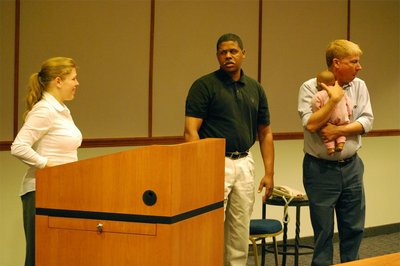Some 50 hotel employees in the region learned how to be gay-friendlier on the job during a training session last week.
The Valley Forge Convention and Visitors Bureau sponsored the gay-sensitivity training May 17 at the Crowne Plaza Valley Forge in King of Prussia. The training was coordinated by the Philadelphia Gay Tourism Caucus and Temple University’s School of Hospitality and Tourism.
Tom Haberland, director of tourism and sales for Valley Forge CVB, said the organization sponsored the program to foster understanding of the growing LGBT tourism market.
“We joined the GLCVB [Gay and Lesbian Convention and Visitors Bureau] and the IGLTA [International Gay & Lesbian Travel Association],” he said. “I think we’ve always belonged to the Philadelphia Gay Tourism Caucus. So I thought it would be a great thing to offer to all of our members, especially in the hotel industry. I think everybody in the world needs to do it.”
This particular training focused on hotel employees, but Haberland said it also applies to other areas of the hospitality industry.
Most of [the participants] were from hotels,” he said. “We had housekeeping, engineering, sales, all across the board. You can have them geared to restaurants and attractions. I find that we have some people out there that could be interested. It took a little urging of people to come to this. But when they were all there, they participated.”
The training involved a series of one-hour real-time dialogues between actors and participants designed to simulate situations they might experience involving LGBT guests.
Dr. Debra Blair, assistant professor at Temple University School of Hospitality and Tourism, moderated the dialogues.
“Dr. Blair would stop them in character and say, ‘What do you think of this?’ and ‘What’s going on here?’” Haberland said. “Then the audience starts asking questions and saying how they feel at that time. So it’s incredibly effective because everybody gets involved in it.”
Blair said most individuals generally don’t have insight into what the consumer is feeling in these situations.
“I think to be able to get feedback from a consumer in a conflict situation, that never really happens,” she said. “You’re in a problem scenario and you really want to ask that consumer what they are feeling and really dig deep. You don’t really have the chance to do that in the real world in terms of customer service. So I think for them to hear from a deep perspective how people are feeling about experiences was eye-opening for them.”
Haberland added the training also deepened participants’ understanding of what being “gay-friendly” means for the hospitality industry.
“One of the things that they didn’t expect is being ‘gay-friendly’ is more than just being friendly,” he said. “They realize now that gay-friendly is knowing where gay people can go to have dinner and, if they ask where is the Gayborhood, they know how to direct them there. It’s that they know as much about gay activities as they would about straight activities. Another thing was don’t assume. That was the number-one thing. That was the largest point. People in the hotel would say, ‘Well, I assumed that the woman was with her husband.’ But she wasn’t. She was with her life partner.”
Blair said she was very pleased by both the number of participants and the range of industry professionals that was represented.
“We had people representing everywhere from maintenance to human resources,” she said. “We had a variety of different positions, which also makes for good training because you get to hear what your employees are feeling and the kinds of questions they ask. It opens your eyes to potential hot-button situations you might have to deal with. That makes you a better-prepared manager.”
Larry Nichols can be reached at [email protected].

